Below you will find selected updates and snapshots from Teaching for Black Lives study group coordinators and hear from members about what they’ve been taking away from the Teaching for Black Lives workshops and classes. We look forward to including more of your stories, photos, and activities in the next newsletter — so keep them coming.
Please do not share this page. It is for study group members only.
Study Groups in Action
MEETING REPORTS
Here are excerpts from the study group coordinator surveys about how each group is getting started.
There was a lot of talk about how much Teaching for Black lives is needed and group members said they were excited about bouncing off ideas and collaborating because there is “safety in numbers” if we’re all doing similar things. That way a parent can’t single out an individual teacher. — Lansing, Michigan
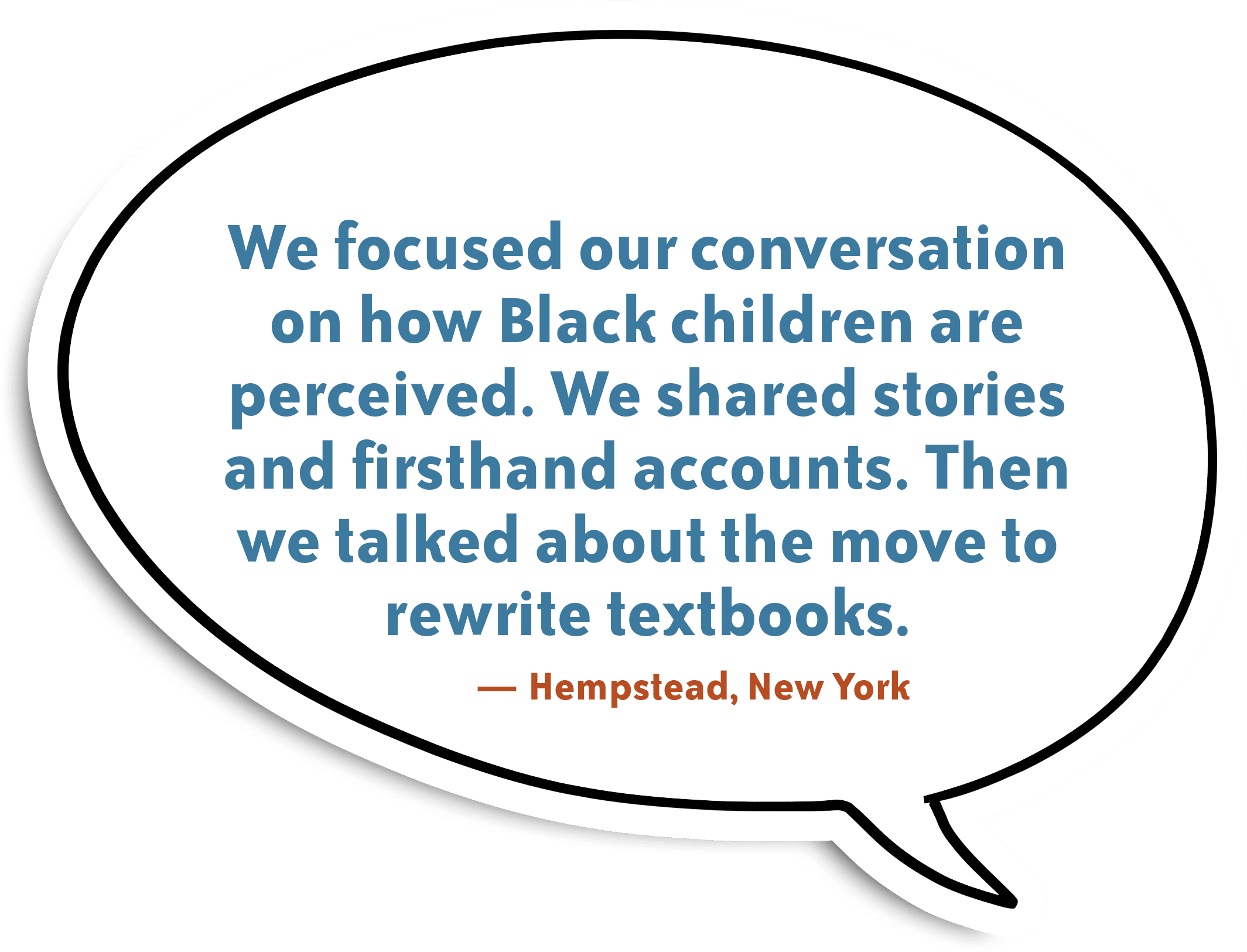 We read the poem “Two Sets of Notes” and established a “syllabus” beginning with “Capitalism” from the New York Times 1619 Project, as well as the introduction to the 1619 Project. Then we will read the article regarding Kaepernick kneeling and “A Talk with Teachers” by James Baldwin. We talked, for an hour and a half on Zoom, about our motivation for joining the book study and building coalitions around issues of social justice across differences and communities. We talked — Oceanside, California
We read the poem “Two Sets of Notes” and established a “syllabus” beginning with “Capitalism” from the New York Times 1619 Project, as well as the introduction to the 1619 Project. Then we will read the article regarding Kaepernick kneeling and “A Talk with Teachers” by James Baldwin. We talked, for an hour and a half on Zoom, about our motivation for joining the book study and building coalitions around issues of social justice across differences and communities. We talked — Oceanside, California
Reading about the experiences of teachers at other schools with pushback from parents/community about teaching Black Lives Matter made us thankful to be in a supportive environment, but this also means that we need to keep pushing ourselves and our colleagues to do more, not just wear a BLM shirt on Fridays. We also talked about how most of the work of keeping staff members in the loop about what is going on nationally in terms of racial justice has been done by Black staff members. We, as a group, are going to take collective responsibility to educate and support our colleagues (starting small with bi-weekly emails) in their anti-racist work. — St. Paul, Minnesota
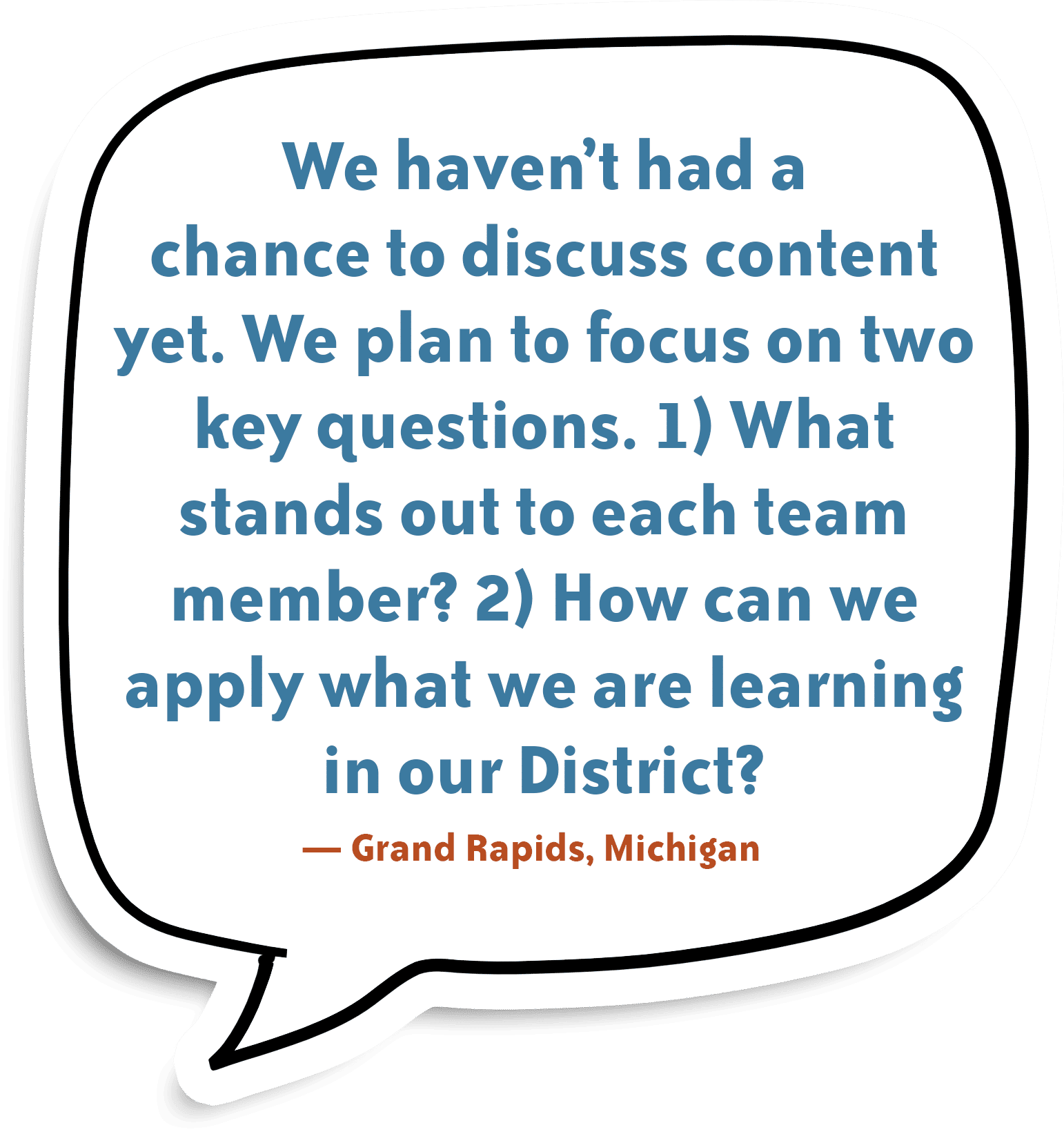 Everyone picked a passage in the first 39 pages and talked about why that passage affected us. Discussion was a lot about Black Lives Matter vs. All Lives Matter and a great analogy of a car with flat tire — all tires don’t matter. — Tucker, Georgia
Everyone picked a passage in the first 39 pages and talked about why that passage affected us. Discussion was a lot about Black Lives Matter vs. All Lives Matter and a great analogy of a car with flat tire — all tires don’t matter. — Tucker, Georgia
We started out with the Black Panthers chapter and the one about racial justice and standardized testing. On the latter we had a nice conversation about how essentially students of color are just made to “act white” in order to survive school. — Las Vegas, Nevada
In our first meeting we set our community expectations and brainstormed how to break down the reading. We decided to take each section and break it into two reading sessions. We are using the questions from the study guide to guide conversations. Our plan is to rotate the facilitation of our meeting each month — this year we are reading and focusing on our learning and next year we will put our learning into action in our libraries across the district. — Garner, North Carolina
Nashville, Tennessee
20 EdCo Ts joined 100s from all over the country to start our study group with @ZinnEdProject. Grateful for the support of @RethinkSchools & the commitment of the teachers of EdCo working on behalf of our students in ALL settings. @JessedHagopian @LadyOfSardines@teachingchange pic.twitter.com/JBo9mCBI9K
— EducatorsCooperative (@Ed_Cooperative) October 5, 2021
LaGrange, Illinois
LT was selected to participate in a National book study using Teaching for Black Lives-Study groups are gathering all across the country and the Zinn Education Project is providing resources to support this work. So proud of our amazing educators & love how they are all in! pic.twitter.com/BduEYJ8kDS
— Dr. Jennifer Rowe (@LTEquity204) November 9, 2021
New Haven, Connecticut
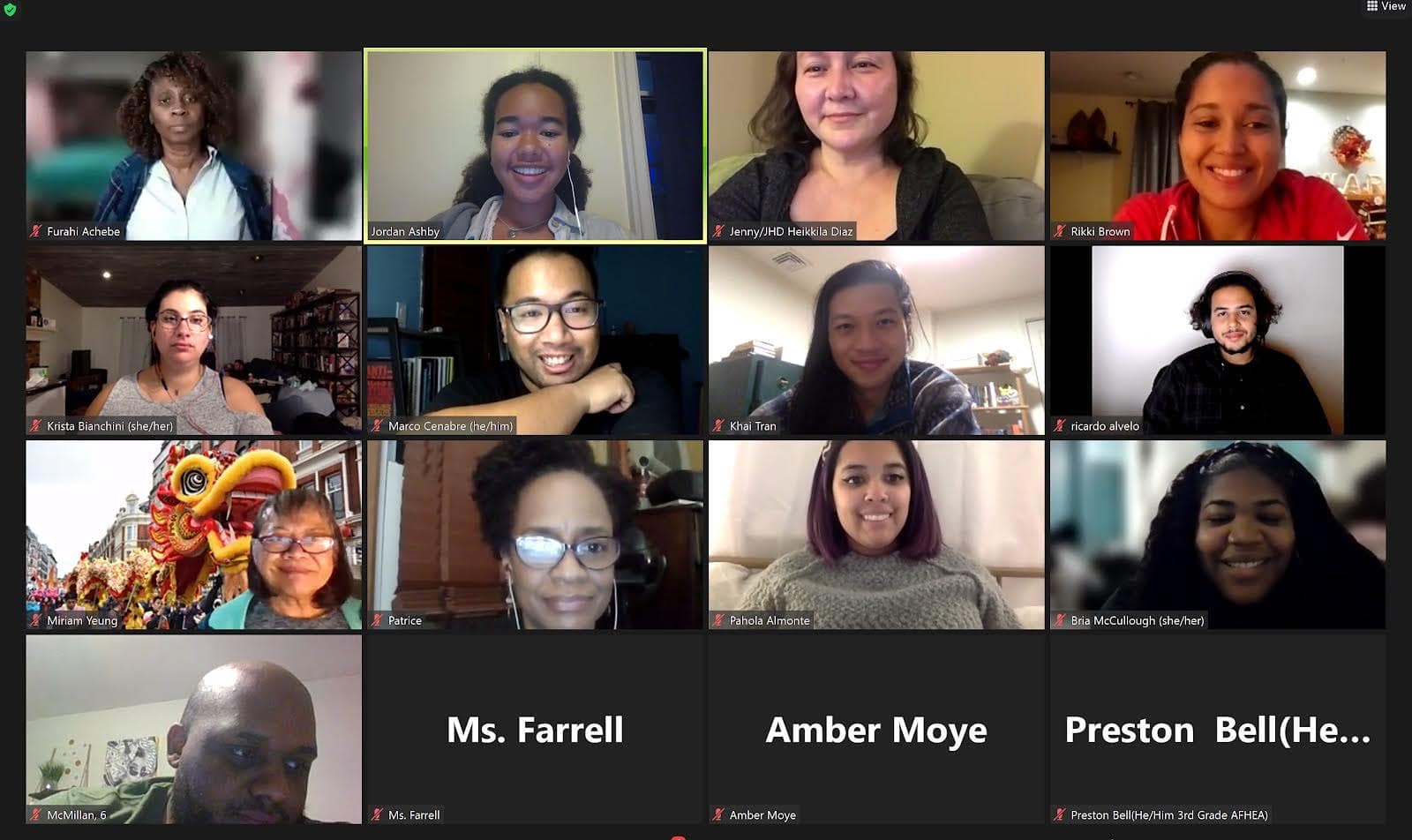
Snapshots from Workshops and Classes
| What was the most important thing you gained from today’s session? What will you do with what you learned? |
| Drawing inspiration from Teaching for Black Lives and recently watching The Neutral Ground, I am eager to discuss the possibility of changing the name of Jefferson Elementary in Pullman, Washington. I teach 5th grade at Jefferson and two other study group members teach 1st grade there. I think taking on this project would be challenging but also result in more local organizing and relationship building, similar to our successful campaign to get a Black Lives Matter mural in downtown Pullman. |
| The reminder that we are stronger when we support one another. We can do this! | Just connecting with amazing educators in solidarity. Hugely reaffirming and energizing. | Think more about how I can support student activism at my school with athletes or non-athletes. Also, how I bring stories of sports into the ELA classroom that offer connections to activism. |
| Learning about how different athletes throughout history have been instrumental in social movements. |
| This movement goes back much further than Kaepernick! | It is critical that we are co-conspirators in this work. Some folx are really in precarious situations. | The opening activity. I need to do that more with our group. Teachers are burned out and this is hard work. I think that kind of creative and quiet outlet is so grounding. And it will bring us together more as we work. |
| Breakout room was terrific. There were 6 of us and we all got to speak a few times. I also appreciated the opening panel — inspiring. I loved hearing Dyan Watson read her letter. I use that with my aspiring teachers. . . and it is just so important and so moving. |
| Hope and courage to do the hard and necessary work. I’m excited to see so many people doing what I am interested in doing in the classroom. It’s inspiring! | Everything! I was nervous about the small-group time (just because I always am), but it was awesome! | Love the interactive aspects of the workshop. Wasn’t expecting that! |
| That we will most likely have students that protest an injustice at some point and as justice oriented teachers we have a responsibility to not just comfort them in private but stand by them in public. |
Fall Issue of Rethinking Schools
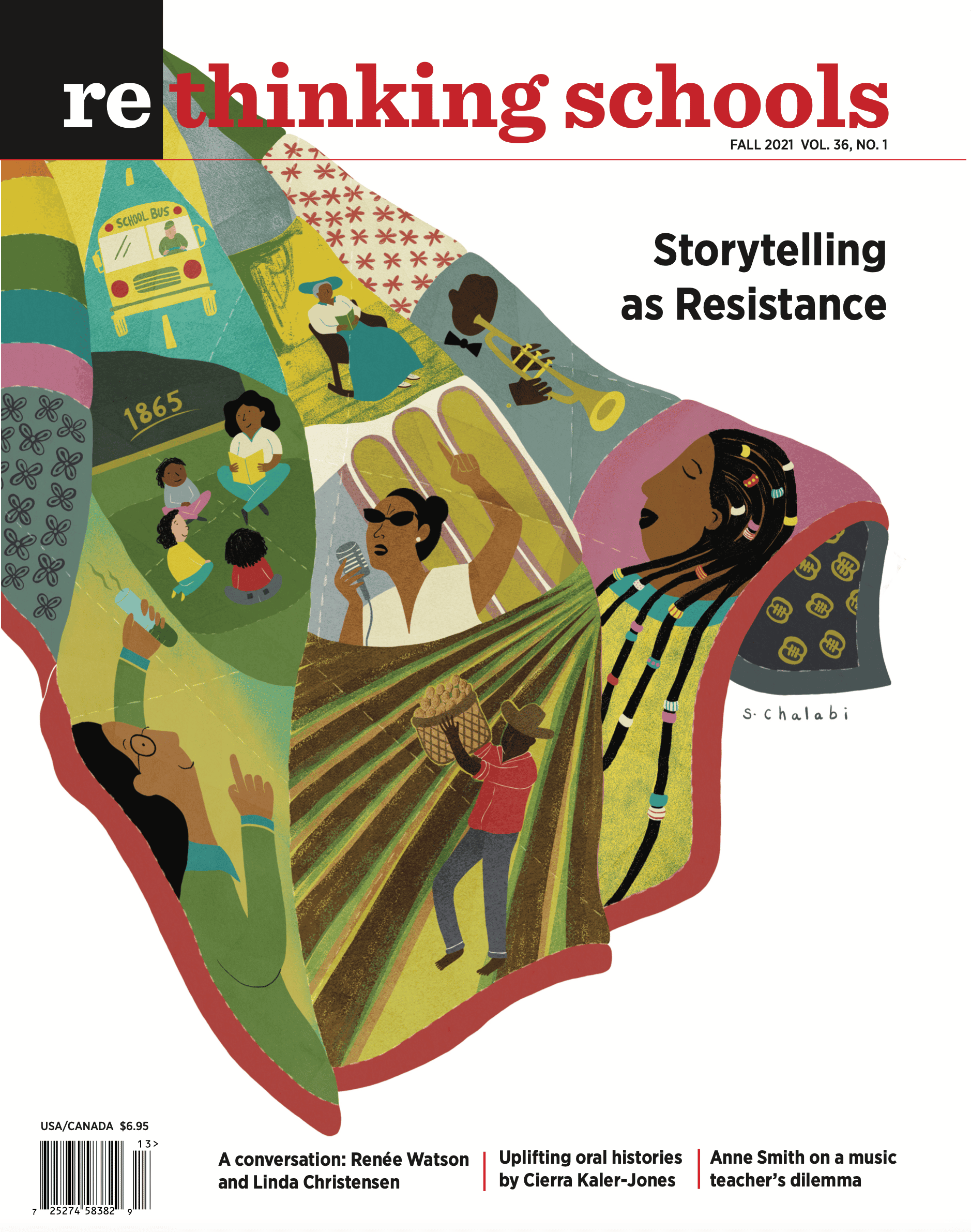 Did you receive your copy? If so, check out these highlights.
Did you receive your copy? If so, check out these highlights.
“Confronting Right Wing Attacks on Racial Justice Teaching” is a must-read for every educator in 2021:
Educators should reject [the] authoritarian logic [of these laws] and continue to use our classrooms to promote democracy. We have an ethical responsibility to answer students’ questions — and to raise additional ones — about the world they’re inheriting. Students deserve facts, not fables.
“The People v. the Hip-Hop Industry,” by Jessica Rucker, a D.C.-area educator, and T4BL study group member from 2020-2021!
Don’t have the magazine yet?
Make sure you have signed up for your free one-year print and digital subscription to Rethinking Schools. Use this link and code: ZEPSTUDYSUB
Please do not share the code — there is only one subscription per study group member. For questions about the subscription, email.
Up Next
There are a lot of events still ahead. Remember that you can keep track of them all at the study group resource page.
- Dec. 6th: The next Teach the Black Freedom Struggle online class will feature Jarvis Givens, author of Fugitive Pedagogy: Carter G. Woodson and the Art of Black Teaching, in conversation with Jesse Hagopian and Cierra Kaler-Jones. Sign up!
- Dec. 13th: A study-group members-only workshop building on Dr. Givens’ work and talk. Using primary documents and readings from the book, participants will brainstorm teaching ideas in small groups. Sign up!
We Want to Hear From You
Please send us your updates, photos, fliers, or other study group artifacts. We welcome thorns, buds, roses and anything in between. We will continue to work to find ways to build connections between your groups and opportunities for sharing and learning together.

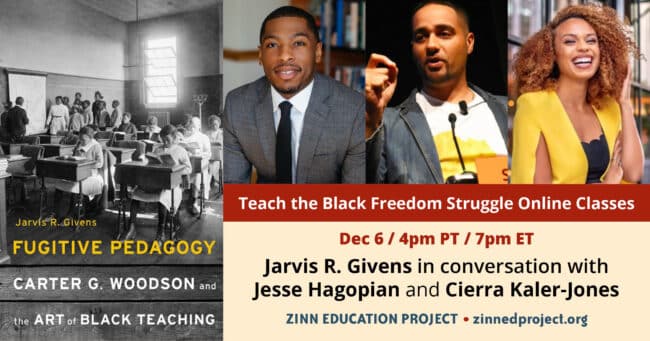





Twitter
Google plus
LinkedIn